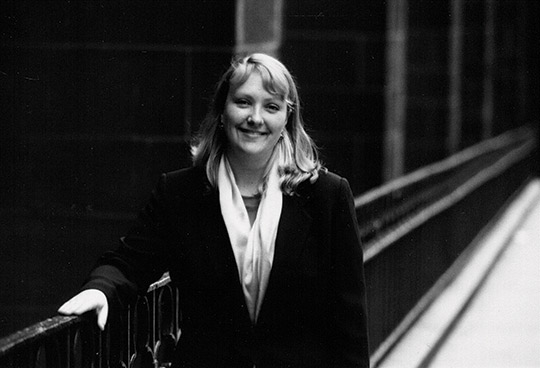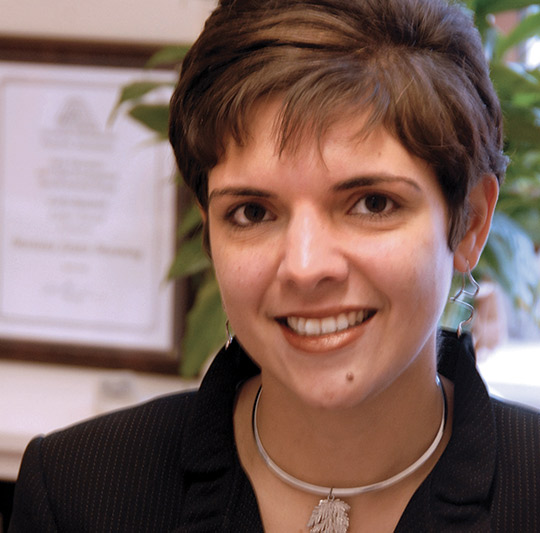Brazil Rising
TC broadens its involvement with the world’s fifth-largest nation
By SIDDHARTHA MITTER
As a high-school student in rural São Paulo state, Brazil, Luciana de Oliveira was inspired by English teacher Denise Abreu e Lima. Today de Oliveira is an Associate Professor of TESOL and Applied Linguistics at TC. Her old mentor — now the head of English Without Borders, Brazil’s government-funded program for university-level English language education — has become a colleague.
As Brazil has developed into the world’s seventh-largest economy, its education sector has grown as well, making the country a natural partner for U.S. education scholars like de Oliveira and policy experts. Brazil has more than 50 million primary and secondary school students and expects to have 10 million university students by 2015. The federal education budget is more than $35 billion with additional state and municipal spending. The federal government has made education a national priority and has placed special emphasis on bolstering science and the teaching of English.
Until recently, U.S. education partnerships with Brazil have been largely the result of uniquely placed individual scholars like de Oliveira leveraging their existing connections. But today, thanks to the growing public and philanthropic interest in international education in Brazil and the accelerated internationalization of U.S. universities, larger, more systemic initiatives are benefiting students and scholars in both countries.
TC faculty members from diverse fields have long-standing involvement in Brazil, including research partnerships and policy projects with Brazilian institutions. De Oliveira, an expert on language education, is slated to co-edit a special issue of Brazil’s top applied linguistics journal and is building partnerships with three Brazilian public universities. Lesley Bartlett, Associate Professor of Education, who wrote her dissertation on literacy education in Rio de Janeiro and Brazil’s northeast, regularly attends top Brazilian education conferences. She sends her doctoral students to study topics like affirmative action in Salvador de Bahia (Brazil’s first colonial capital) and participatory budgeting in Pôrto Alegre, capital of the state of Rio Grande do Sul.
Ryan Baker, Associate Professor of Cognitive Studies, who has taught at the Faculdade Estácio de Alagoas in the northeastern city of Maceió, studies how students in different countries use educational software. In Maceió, several of Baker’s post-docs studying a school in a local favela (shanty town) have found that students there work with software differently than do U.S. students. They concluded that the assumptions underlying artificial-intelligence models do not necessarily hold from one society to the next.
Henry Levin, William H. Kirkpatrick Professor of Economics and Education, who was active in Brazil’s Minas Gerais state in the early 1990s, is now coordinating a five-country study of the ways that different school-choice models affect student stratification. The study, funded by Columbia University’s Institute for Social and Economic Research and Policy, includes Brazilian scholars and includes Rio de Janeiro among its research sites.
Brian Perkins, Director of TC’s Urban Education Leaders Program, has been a consultant since 2010 to the municipal government of Rio de Janeiro, helping local authorities build leadership capacity in the schools. Perkins and two recent TC doctoral graduates advised Rio’s education department to set up a leadership development academy for principals, which is about to graduate its first annual class. Two years ago, Perkins brought a delegation of Brazilian educators to New York City, where they visited The Laboratory School of Finance and Technology, a highly regarded Bronx middle school led by Ramon González, a TC doctoral candidate who is a graduate of the College’s Cahn Fellows Program for Distinguished Public School Principals.
Now TC hopes to tap the potential of still larger projects with Brazilian partners. One venue for growth is the new Columbia Global Centers/Latin America in Rio de Janeiro, which is identifying and organizing projects with local partners in education. William Stroud, Assistant Director of the Consortium for Policy Research in Education (CPRE) at TC, says that with the support of the Global Center, CPRE is currently discussing two possible projects in Rio: a pilot to support elementary schools that are failing to meet local standards for achievement and an institutional leadership program to help foster a culture of collaboration in secondary schools.
Meanwhile, the Rio Global Center has launched an initiative, supported by a grant from the Columbia President’s Global Innovation Fund, to develop a public management executive program across multiple fields. Perkins is on the team, along with colleagues from the School of International and Public Affairs, Columbia Business School and the Mailman School of Public Health. The aim, Perkins says, is to build capabilities that translate across education, public health and public administration, and to form practical expertise that can carry over to other countries. “Something may come up in Brazil now that will come up in India five years from now,” Perkins says. He’s been impressed by the team at the Rio center and with the type of engagement this model signals. “It demonstrates the University’s substantive commitment to doing work in Brazil,” he says. “We’ve made an investment. We are there.”
Another promising avenue to bolster ties is growing philanthropic interest in international education in Brazil. The lead player is the São Paulo–based Lemann Foundation (Fundação Lemann), which made what Columbia Provost John H. Coatsworth called a “game-changer” gift to the University earlier this year. The foundation’s commitment includes establishing the Lemann Center for Brazilian Studies, funding a professorship of Brazilian Studies and institutionalizing funding for Brazilian master’s degree students at Columbia’s graduate schools. The first Lemann-funded student at TC, Tonia Casarin, graduates this spring, and three new students will arrive this fall.
TC scholars involved in Brazil say the opportunities for valuable work are abundant. De Oliveira, for instance, dreams of starting a program to remedy a chronic problem in Brazil: the lack of English language proficiency among local teachers of English. “We could develop a certificate in teaching English as a foreign language that would take place online, with a summer residency at TC,” she says. Such a program would not only address a pressing Brazilian need, but also benefit TC’s TESOL students, who could work directly with Brazilian participants.
“My own work, my teaching and my students’ research have all been enhanced by steady exchange between TC and Brazilian institutions,” Lesley Bartlett says. “I really hope we will have the opportunity to do more — to have more leave time and travel support, and to do more organized collaborative research and teaching with faculty there.”
FAMILIAR WITH THE TERRAIN Former Brazilian preschool teacher Mariana Souto-Manning, Associate Professor of Early Childhood Education, is researching quality teacher education in Brazil, Singapore and the United States. Her book, Freire, Teaching and Learning: Culture Circles Across Contexts (2010), explores the great Brazilian educator’s method to foster students’ awareness of forces shaping their lives.
GROWING TC’S GLOBAL LEGACY
A new international advisory committee reflects the broad range of TC faculty
As head of a new faculty steering committee for the Office of International Affairs, education anthropologist Lesley Bartlett leads an effort to take stock of TC’s international efforts “to understand how to build on them.”
Bartlett, whose research spans Latin America, the Caribbean, sub-Saharan Africa and U.S. immigrant and multilingual communities, believes TC’s size and diversity are great assets for international work: “When a person or a group identifies an area they want to work on, we almost invariably have qualified faculty and students.”
The advisory committee reflects that breadth. Current members are Madhabi Chatterji (assessment); Catherine Crowley (speech pathology); A. Lin Goodwin (teacher prep); Alexander Karp (mathematics education); Henry Levin and Mun Tsang (economics); Xiaodong Lin (computing and technology); Dolores Perin (adult literacy); James Purpura (TESOL); Mariana Souto- Manning (education); Gita Steiner-Khamsi (education development); and Lena Verdeli (clinical psychology).
Published Monday, Jun. 2, 2014

